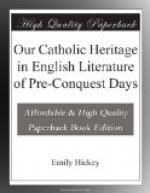How familiarly these words ring! For our heritage of praise has come to us from afar and from of old.
And again rises the chant triumphant, to the endless honour of the Eternal Son, whose coming into the world and birth and death are all typified by the mystical Phoenix.
I have dwelt at considerable length upon this poem for various reasons. One is that it is of a special kind, the allegorical; another is that, as I have pointed out, it is full of a richness and colour and love of nature, which is not found in the earlier poetry. Where does it come from? It is most probably part of the Celtic influence which has set its magic touch upon English poetry and given to it that “light that never was on sea or land.” It has done far more than give a sense of colour and beauty and nature-love. More than the love of nature in its beauty is the sense of fellowship between man and nature, the sense that makes man see his own joy and sorrow reflected in the mighty heart of Nature. This is a very big subject, and can only be touched on here. The beginning of this influence, which came also from Wales and France, is due to Ireland. We must never forget how great a debt England owes to Ireland. May we say that it was from the Irish missionaries whose feet hallowed the soil of Iona that the English north country caught that intense glowing love of the Holy Faith, which even still, in a measure, differentiates the north of England from the south?[C] We must value very greatly the solid foundation of strength, sincerity, what we call grit, directness of expression, simplicity, to be found in early English work; all these being great things, yet capable of receiving into their fellowship and above it and beyond it, that which should give what we look for in a great literature; the power of appeal to various kinds of people, to “all sorts and conditions of men.” And to Celtic influence, Irish, British, French, we look for that which turns grey, however fair a grey, to green, and purest pallor to the glory of whiteness. It is beautiful, is it not, to think how various kinds of men and women can help to complete one another by giving and taking what each has to give, and each needs to take? It is the same with nations: each has its own gifts, its own needs; and for a great and noble world-literature we need the gifts of all.
[Footnote C: I have not, of course, forgotten the mission of St Paulinus; but, as history shows, this does not affect the question here. Glow and fervour permeate life, and literature being its outcome could not but keep the mark of what had been set upon that life.]
CHAPTER IV
Prose-writing. St Bede the Venerable. His love of truth. His industry and carefulness. Cuthbert’s account of his last days. “Bede whom God loved.”
We leave our poets now for a time, and go to the writers of prose in early days. We want first to think about a beautiful-souled religious, who gave us the first great historical work done in England. We know him as St Bede, the Venerable Bede, as he has been called from the epithet inscribed on his tomb in Durham Cathedral, which bears the words




